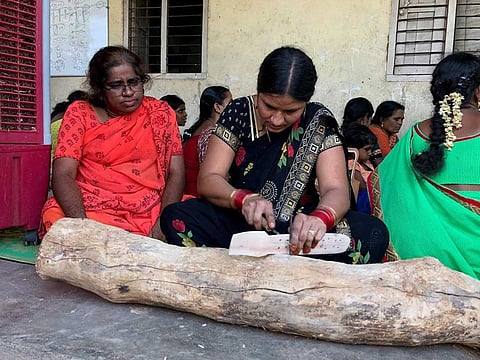India: Udayagiri women carve out a future from an ancient craft
Group of enterprising women revive craft of wooden cutlery that goes back 500 years

Home to a range of languages, cultures, customs and traditions that are hard to find anywhere else, India is a microcosm of the global human diversity.
It is this diversity that makes India distinct and truly dynamic.
Nothing in India represents its composite nature more than its craft traditions. There is so much variety and ingenuity in the Indian art and craft that the craft of the whole world put together pales in comparison.
Craft is India’s real heritage and it is the only thread that keeps its citizens connected with the heritage of the country.
Wooden wonder
Udayagiri’s unique craft of wooden cutlery is one such tradition that traces its roots back to at least five centuries, when the Indian royal patronage attracted artisans and people of skills and knowledge from across the world.
Not so long ago, this craft was a monopoly of men and was on the verge of death, but now a group of dexterous women have made it their own, putting it on the path of prosperity.
A remote town in the Nellore district of Andhra Pradesh, Udayagiri is surrounded by arid weather and rugged mountains. Until recently, the ruins of a medieval fort was its only claim to fame, but now this enterprising team of craftswomen are putting it back on the map through their deftness of hands and sharpness of minds.
The women have not only revived a legacy but have also boosted the little town’s flagging economy, giving themselves a new lease of life.
The decline began a few decades ago, when only one craftsman was left standing, as artisans started abandoning the tradition one after another for more lucrative opportunities.
Inspirational move
This ancient legacy would have vanished if not for an inspirational move by the veteran artisan, who didn’t want the craft to die with him.
Going against the established norm, Shaikh Abdul Basheer, handed the hammer and chisel to his daughter Ghousia Begum and this turned out to be a masterstroke.
“After my teacher Qazi Miyan died I was the only person practising this craft in the town, like him I also tried to woo people in order to train them, but no men were interested. So, I decided to train my only daughter and she learnt quickly and took it forward,” said the 84-year-old, who has now retired, but gleefully oversees the blossoming of the seed he sowed a couple of decades back.
His daughter, Ghousia Begum, is now an award-winning artisan, receiving state recognition not only for her skills but also for her efforts in turning around a legacy and empowering local women.
“So far we have trained more than 400 women from the town. I am happy to see this craft flourishing through the efforts of our women. I glad that so many households have found happiness through the income their women earn in a safe and secure environment,” said Begum, who is supported by her young, educated son and a Nellore based NGO in this endeavour of reviving the craft and the local economy.
Reaping the rewards
Their collective efforts have started bearing fruits and the whole town is now reaping the rewards.
“Following our consistent efforts in reviving the cutlery craft, introducing new designs, empowering the women and boosting the local economy, we received recognition from the national government in 2016 through the Geographical Indication Tag and multiple awards,” added Begum who continues to train more women from the town, expanding the umbrella of empowerment.
With Begum’s educated and enterprising son Zakir Hussain heading the operations, all three generations of the family are now involved.
Hussain is the key link between the artisans, the government, the NGOs and the customers. He is the missing link that most craft clusters are seen wanting.
According to Hussain, the problem most craft clusters face is lack of local and skilled hands to promote the craft and market the products.
“Usually, in the villages there is nobody to deal with the government and NGOs to take advantage of government benefits or training programmes. There is no body to do the marketing. When I saw our people facing this issue and how the cluster was growing with the participation of women, I thought I should get involved to realise the full potential of this project and give benefit of my education to my community,” said Hussain, who regularly takes their ever increasing range of handmade wooden cutlery to national exhibitions to promote the art.
Expanding range
Apart from the usual cutlery items, the cluster is now adopting new designs, with the regular training programmes conducted by Nellore based Chaitanya Jyothi Society. The new products include toys and jewellery to coasters and decorative items.
But, none of this would have come to fruition without the octogenarian craftsman’s vision.
“The craft was facing a crisis when I got interested in it. Qazi Miyan was the only master craftsman alive at that time. He was desperate to train people to make sure the legacy doesn’t die with him. I became his apprentice and continued from where he left. I am glad I took this up,” said Basheer, recalling his early days, some five decades back.
Though, Basheer doesn’t know much about how the history of wooden cutlery evolved in the town, he is very happy to see the flourishing future of a tradition that he helped revive.
Sign up for the Daily Briefing
Get the latest news and updates straight to your inbox


